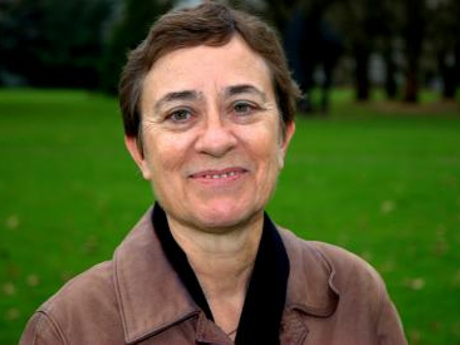In Their Own Words
Lisa Steinman's “Rainy Afternoons of the Soul”

Rainy Afternoons of the Soul
No dark nights: the only sign, that there are no
signs. No signs at all. Oh, earth, this could be
a deal breaker. Desire stitches night to day.
I ask the pencil to make an apple: brown
leaf, ridged folds of rust & yellow. The pencil
declines. The unsketched apple's perishable,
reticent, objectively there, though a pen,
an umbrella, & a key have gone missing.
Do lost opportunities count? In the bird
feeder, a song-and-dance sparrow pecks away.
In our house, weekly, you feed the birds while I
marry the socks into matching pairs. I speak
in indexicals—no nominalist, I—
so everything's pared down: in the shower,
the cuttle-bone-like core of a bar of soap,
just for example. Although I consider
how Montaigne says it is pitiful to be
languid & feeble even in one's desires.
And we don't want pity, but birds . . . taking flight
presumably. Like the old man on the bus
whose finger traces signs on his jeans—no ink—
writing lists of items he can't forget, or
maybe the letters of a new alphabet
with which he could break into another world.
Not the one where the birds at the feeder are
food for thought, domestic hieroglyphs. Or where light
glints on the red pick-up truck across the street
& almost makes up for all this emptiness. For
the loneliness, I'd say, but that requires
desire. Like Pascal's. He carried near his heart
a scrap of parchment that said "joy." I don't know
why I'm haunted by 17th-century
Frenchmen when outside my study a humming
bird tries to drink from a red plastic mesh bag,
the kind that holds or used to hold fruit, the bird's
small beak thrusting into what contains only
air & is itself more emptiness than weave,
like a series of commas trying to splice fragments
of thought together. Go figure. All
night I think about fishing as a better
sign of truth. About how fish are in motion,
threatened, & need to be released, though I wake
asking "Why bother the fish at all?" Today,
being Sunday & a holiday, you note
that we will not get mail twice. I can see some
turning point arriving from quite far away.
God save us, I'd say, were I inclined to invoke
higher powers—not this trying, nothing doing.
From Absence & Presence (University of Tampa Press, 2013). Reprinted with the permission of the author.
On "Rainy Afternoons of the Soul"
"Rainy Afternoons of the Soul" is a poem that surprised me. After my previous books, featuring poems that included everything (even one kitchen sink), I'd been trying to write shorter, slightly more focused if still meditative, poems. However, what I'd come up with—poems I thought of as "single-gestured," most of which were under fifteen lines long—seemed too tidy, at best, and in any case unsatisfying.
Sitting one morning at the dining room table, I saw a humming bird trying to feed from a bag of suet hung outside the window—presumably attracted by the red color of the bag, not the suet (which humming birds typically don't eat). In any event, the bird did not appear to be finding what it hoped for in that bag. But the sun came out, which is cause for unreasonable pleasure in early spring in the gray, damp Pacific Northwest where I live. And I'd been reading Ponge and Pascal, thinking I might be inspired by the condensation found in the work of both writers: Ponge as a poet of things and Pascal's aphoristic Pensées as a kind of poetry of thought.
"Rainy Afternoons" then began as I tried to figure out why— since I don't really believe in signs—these things seemed to me related, or even to be signs of something beyond the mere arrival of spring. What pleased me most may have been then recalling an image of an older co-worker, a poet I admired but didn't know well, who was (I think) trying to learn Chinese and who would practice Chinese calligraphy (or so I imagined) by tracing Chinese characters with his index finger on his lap during meetings. I was never sure I was correct about what his signs were signs of, which may be why I carried the image in my head for almost a decade before it found a home in this poem.
Eventually I started writing simply to thread my way through the tangled relationships between these images of the quotidian, and of the perhaps false promises of something more, and of the recalcitrant untidiness of the world, only gradually—well before I thought of using couplets and syllabics to yield a sense of some not-quite-discernible ordering principle tying together images from disparate sources—finding I had begun a poem about the various, flexible or malleable ways that mind, language, and world meet.


